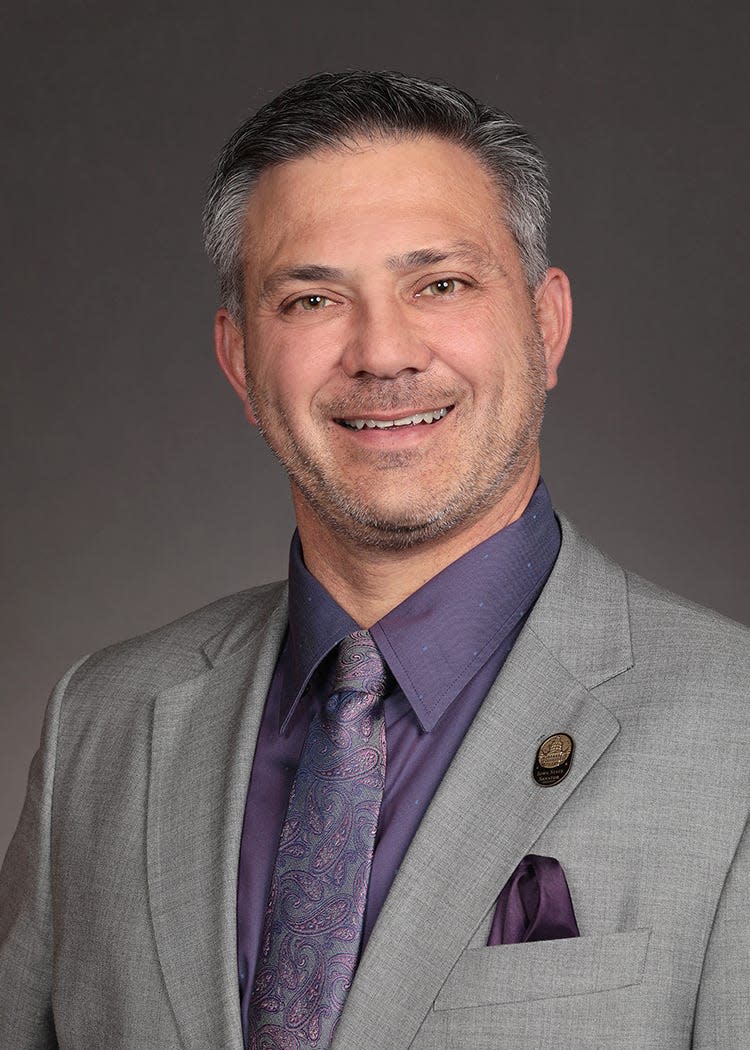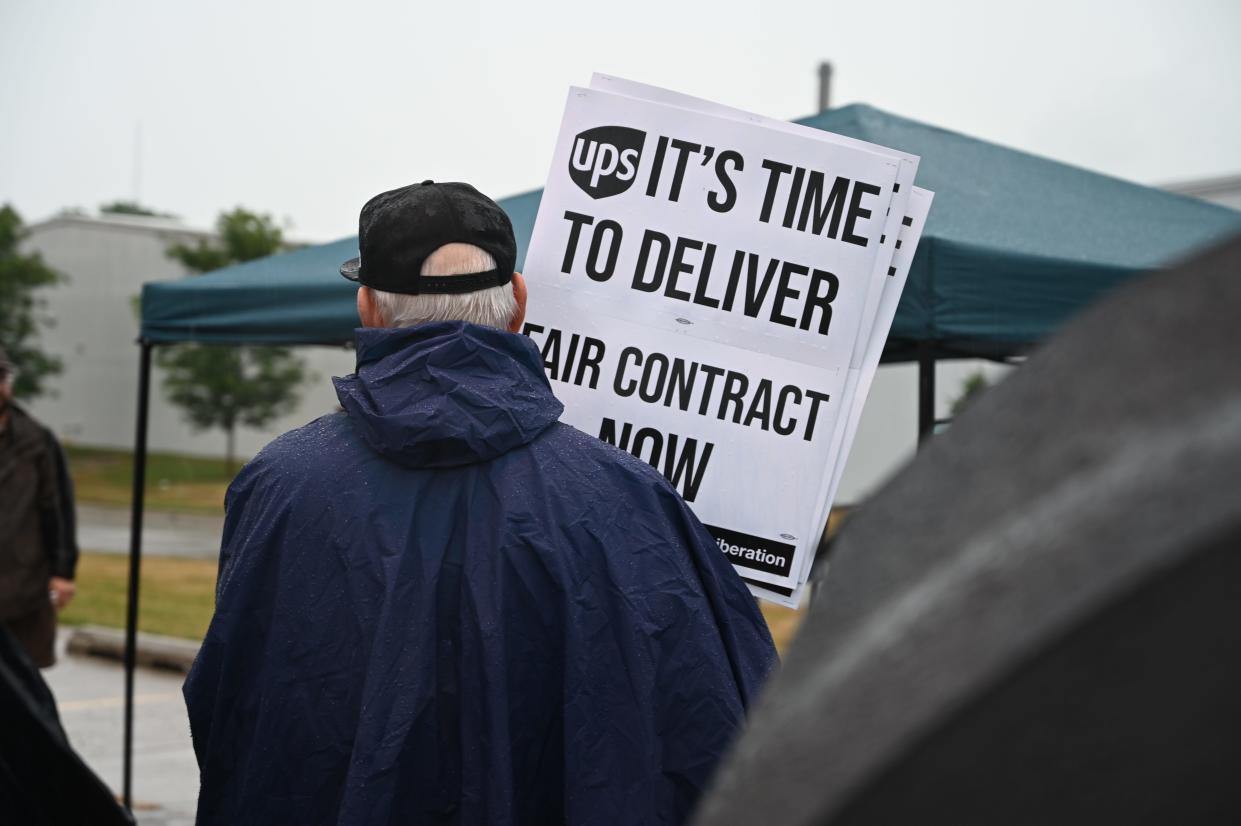Teamsters will rally at Iowa Capitol against alleged 'union-busting,' raise strike funds
After years of contending that its bargaining clout for public employees is being eroded by the Iowa Legislature, the Teamsters union is planning to showcase its displeasure as well as its solidarity at the Iowa Capitol on Wednesday.
The union also is leaving the door open for the possibility of “rolling strikes,” with Teamsters Local 238 Secretary-Treasurer Jesse Case saying it is raising money to offset any fines that might occur from striking. Striking is prohibited for public employees in Iowa, among whose unions the Teamsters are prominent.
“You can’t legislate a movement out of existence," Case said in a prepared statement. "Union busting legislators need to know that strikes are legal in the private sector, and we are raising money to offset their punitive fines while we contemplate rolling strikes in the public sector. The only way to avoid disrupting business in Iowa is to not disrupt workers’ rights.”

Rolling strikes are a labor action in which some union workers strike while others continue to work, and are used to conserve strike funds while also making labor actions unpredictable for employers.
Reinforced by six Teamsters locals from Iowa and three other states ― Minnesota, Illinois and Nebraska ― the union is planning what it's calling a “Teamsters Caravan” around the Capitol on Wednesday. Overall, the Teamsters represent more than 5,000 Iowa workers, according to UnionFacts.com.
Iowa Senate to consider bill that would put responsibility on unions when employers don't comply with requirement
The Iowa Senate is expected to take up a controversial bill affecting public sector unions this week. The proposal is the latest legislation drawing the ire of organized labor and affects required recertification elections for bargaining units representing public employees.
The bill would amend legislation passed in 2017 that requires the bargaining units to hold a recertification vote about 10 months before the expiration of their existing contracts, allowing members to say whether they want to continue to be represented by the union.
The new measure would require the employer― such as a state agency, county street department, city sanitation department, a police department or a school ― to provide a list of employees in the bargaining unit within 10 days of receiving notice from the Iowa Public Employee Relations Board (PERB) of a recertification election.
If the employer fails to submit the list within five days, PERB would immediately decertify the union. The union would then need to petition a district court to require the employer to submit the list of employees.
Unions opposed the measure in subcommittee and committee hearings. Despite their opposition and one of the majority Republican members joining Democratic members to vote against it, the Senate Workforce Committeelate Feb. 14 advanced the bill to the full Senate. The vote came after more than two hours of debate and 11 failed attempts by Democrats to amend the bill.
Last week, Case posted a strongly worded video on YouTube accusing Republican lawmakers of union busting and vowing action.
“We’re not taking it," he said in the video. "Here’s what we’re going to do. We’re going to take the fight to them. We’re going to take the fight to their town, to their county, to their farm, to their business. We’re going to have rolling strikes across the state of Iowa.”
Sen. Adrian Dickey, R-Packwood, chair of the Iowa Senate Workforce Committee, in a statement Sunday, dismissed the Teamsters' planned actions as "simply continuing their long-standing opposition to jobs and freedom."
GOP says bill addresses failure by some public employers to hold required recertification votes
The unions saw their bargaining power reduced in the 2017 Legislature with a bill that left many public sector employees with only the ability to negotiate wages, leaving health insurance benefits and work condition issues up to employers.
In their news release announcing the Capitol rally, the Teamsters say that in 2017, “Corporate-owned politicians decided that snowplow drivers, sanitation workers, school bus drivers, teachers, nurses, and other public servants shouldn’t have a voice on the job and the results have been devastating ― from declining wages and benefits to staffing shortages and soaring turnover in our schools and public services. But these attacks haven’t been enough for some Iowa legislators. Now, some state legislators are proposing additional union-busting legislation.”
Republicans who back the bill said in the hearings that the measure addresses backsliding by government agencies that have failed to insist on recertification votes before negotiating new contracts. They say failing to do so denies workers the right to periodically decide whether they want to continue to have union representation.
The Teamsters' news release also singles out Dickey, the Senate Workforce Committee chair, as “leading the union-busting at the Iowa State Capitol,” saying legislation passed during his tenure has included weakening child labor laws, union busting and passage of a bill that limits tort liability on commercial vehicles, a measure the Teamsters say benefits the trucking company he owns.

Dickey, however, fired back at the Teamsters in a statement on Sunday.
"The Teamsters are nothing more than a special interest group opposing common sense opportunity for Iowa youth, freedom of representation, and pro jobs policies. Observers of Iowa's political process know they are simply continuing their long-standing opposition to jobs and freedom," Dickey wrote.
He also defended the changes made to labor laws and the one currently under consideration.
"The bill that they are using as a rallying cry, is nothing more than a technical cleanup to legislation that was passed in 2017. Last year, 41% of Iowa public sector workers that had union representation, did not have a voice due to a loophole in the legislation passed in 2017. If the public sector employer and the union are following the law, nothing will change for them," Dickey wrote.
Referring to the bill that lowered minimum ages for certain kinds of employment, he wrote that "last year‘s youth employment opportunities bill simply added some flexibility for 14 to 17 year olds who may want to have a part time job after school or in the summer. Yet, once again unions misrepresented that bill by calling it a '“'child slave labor'”' bill, when anyone who read the bill and had two ounces of common sense understood it was merely aligning Iowa law with the school and extra-curricular routines of Iowa youth. Iowans understood that truth, which is why the bill was widely supported by the majority of Iowa parents according to a Des Moines Register poll,"
Dickey also said the tort liability reforms actually helped Teamsters drivers and that the union regrets not being able to take credit for passing.
"Last year tort reform was passed that affected thousands of Iowa employers, certainly not just for myself. Fact is that legislation helped Teamster drivers because it shifted liability that their drivers would have been exposed to if they caused an accident, and placed the liability on their employer. The Teamsters did nothing to help their members on that bill, now attack me for helping pass this legislation only because it was a good thing for their members that the union brass can’t take credit for," he wrote.
Teamsters' aggressive stand comes as pro-union sentiment rises among public

Nationally, the Teamsters enjoyed high-profile success in summer 2023 when they were able to successfully negotiate a new contract with United Parcel Service Inc., gaining increases in wages and the creation of more full-time jobs as well as a number of workplace protections and improvements.
A Gallup poll released in August of 2023, found that 67% of Americans approve of unions, a proportion that has been steadily rising since 2009.
More: How Iowa Teamsters became the go to for national Democratic campaigns looking to unionize
The Gallup poll also found:
77% now say that unions mostly help rather than hurt union members. Today’s reading is up 7 percentage points from 2016 and 11 points from 2009 and essentially ties the prior high of 76% in 2003.
A record-high 47% now believe unions help rather than hurt nonunion workers, well above 38% in 2016. That's tied to the prior high in 2005.
A record-high 61% saying unions help rather than hurt the U.S. economy, eclipsing the prior high from 1999 by six percentage points.
57%, roughly matching the prior high, saying unions mostly help the companies where workers are unionized.
Despite the rising pro-union sentiment, unions represented about 8.8% of Iowa’s workers in 2023, less than half of the 20% represented by bargaining units in 1990, according to the U.S. Bureau of Labor Statistics.
Collective bargaining for Iowa public employees started in 1974 under then-Gov. Robert Ray, a Republican. In return for the rights to negotiate wages, benefits and working conditions, public employees surrendered the ability to strike.
Critics of legislation they say has reduced collective bargaining rights in recent years point to the spirit of “promoting harmonious and cooperative relationships between government and its employees,” a goal stated in Chapter 20 of Iowa Code they contend is being usurped by continued reduction of the ability of unions to effectively negotiate on behalf of workers.
Kevin Baskins covers employment and the economy for the Des Moines Register. Reach him at kbaskins@registermedia.com.
This article originally appeared on Des Moines Register: Rally planned, rolling strikes possible as union fights new legislation
